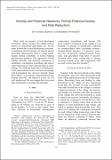Kinship and Financial Networks, Formal Financial Access, and Risk Reduction
Author(s)
Kinnan, Cynthia; Townsend, Robert
DownloadTownsend_Kinship and.pdf (600.6Kb)
PUBLISHER_POLICY
Publisher Policy
Article is made available in accordance with the publisher's policy and may be subject to US copyright law. Please refer to the publisher's site for terms of use.
Terms of use
Metadata
Show full item recordAbstract
Kinship networks are beneficial for smoothing consumption and investment, but the channels are not well understood. We study the financing devices used for consumption and investment by Thai households. Households that are connected to banks achieve significantly better consumption smoothing than unconnected households; indirect connections via inter-household borrowing are as effective as direct borrowing. Investment appears to be facilitated by kinship: households with kin in the village display reduced sensitivity of investment to income, while connections to banks do not significantly reduce sensitivity. Kin may act as "implicit collateral," permitting borrowing that would violate repayment constraints in its absence.
Date issued
2012-05Department
Massachusetts Institute of Technology. Department of EconomicsJournal
American Economic Review
Publisher
American Economic Association
Citation
Kinnan, Cynthia, and Robert Townsend. “Kinship and Financial Networks, Formal Financial Access, and Risk Reduction.” American Economic Review 102.3 (2012): 289–293. Web.
Version: Final published version
ISSN
0002-8282
1944-7981